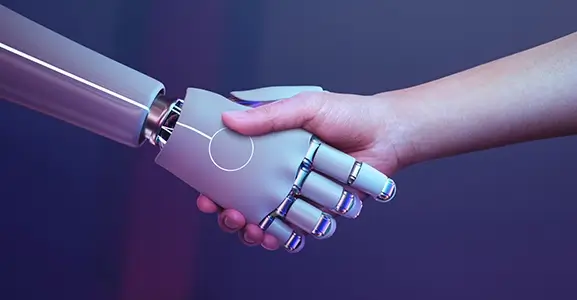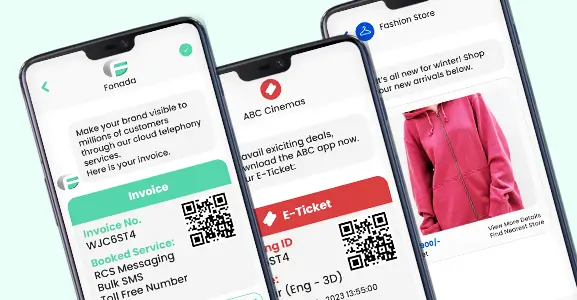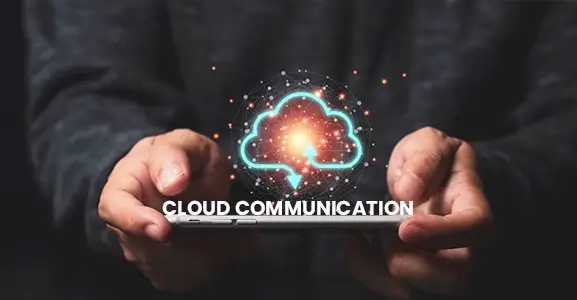AI-powered marketing platforms provide smart solutions that help businesses understand audiences better. They produce valuable insights using AI, leading to higher conversions and reducing the workload for marketing teams. These platforms use advanced algorithms to study data, allowing for focused advertising and personalized customer interactions. Moreover, they support predictive analytics, predicting trends and consumer behaviors. This helps businesses make informed decisions to stay ahead in the competitive market.
This blog focuses on trending AI marketing technologies and how they assist businesses in streamlining operations and enhancing customer experiences. If you’re interested in learning more about AI marketing, we highly recommend reading the entire blog to deepen your understanding of the topic.
So let’s get started…
Role Of AI Marketing In The World Of Business Communication
- AI in digital marketing means using artificial intelligence to help marketers understand customers better and create more effective content.
- AI technology customizes marketing materials to better suit each customer’s journey. By using AI, marketers can collect data, analyze it, and identify patterns in audience behavior and economic trends to make automated decisions.
- In marketing, AI is used to gather data, study what consumers like, and analyze that information to help a business reach its goals. AI tools and software can automatically respond to clients.
- AI in marketing can analyze data, purchase advertising space, generate content, personalize advertisements, and more.
- AI marketing solutions use data and customer profiles to figure out the best ways to connect with customers and facilitate AI personalized marketing.
- These solutions are capable of sending personalized messages at the right time, aiming for maximum efficiency.
- Many digital marketers today rely on AI in advertising to support their marketing efforts or handle tasks that require less human involvement.
Why Do We Need AI (Artificial Intelligence) In Sales And Marketing?
Using AI in sales & marketing allows you to:
- Work faster with a smaller workforce and reduce operational costs.
- Minimize your budget through data-driven decisions
- Optimize performance data automatically
- Write creative and persuasive copy to improve conversion rates.
- Bid effectively in your campaigns.
- Help you create a team-specific marketing strategy.
- Help you to make informed decisions for better sales
- Strategize your sales strategy
- Connect with your target audience through AI social media marketing strategies
Types Of AI (Artificial Intelligence) Marketing Solutions
AI marketing solutions help businesses in multiple ways by enabling them to understand their customers and optimize their marketing efforts seamlessly.
Here are a Few Types of AI (Artificial intelligence) Marketing
Personalization Tools
AI personalization tools help businesses analyze customer data based on customers’ preferences and interests. For instance, the online streaming platform Netflix uses advanced AI algorithms to recommend shows and movies to its viewers based on their weaving history.
Predictive Analytics
Today’s advanced AI-powered marketing solutions are capable of predicting future outcomes based on the available historical data. For instance, Amazon uses predictive analysis to determine users’ preferences and interests based on their browsing and buying attributes
Chatbots And Virtual Assistants
AI automation enables businesses to use AI bots that can efficiently engage with their customers, answer their queries, and assist in real-time. For instance, chat bought on websites like Shopify helps its visitors to navigate through its products and help them compare, find, and buy products.
Content Creation And Optimization:
AI marketing solutions enable businesses to use innovative AI tools that assist marketers in creating and optimizing content for better customer engagement. These tools help in creating ad copies, social media content, and creative content for campaigns. For instance, Grammarly helps writers improve their writing and fixes minor and major grammatical errors using AI.
How Does (Artificial Intelligence) AI Marketing Work?
AI marketing is all about leveraging advanced artificial intelligence techniques and tools to understand human behavior and preferences. It enables businesses to optimize their marketing strategies and helps them to improve their efficiency
Let’s Understand How It Works ?
Data Collection And Analysis
AI is trained to collect relevant information about users from reliable sources like social media, website interactions, demographics, purchase history, etc. It then analyzes the extracted information to gain a better understanding of customer preferences, buying behavior, purchasing patterns, etc, This helps them to strategies their marketing strategy for better outcomes.
Consumer Segmentation
Consumer segmentation enables businesses to understand their customers in a more constructively and practical way. It helps them to categorize each customer with their buying preferences and customer journey. AI algorithms enable businesses to segment their customers into groups based on their interests, demographics, and behavior. This is highly effective for businesses as it helps them to personalize their marketing campaigns and improve ROI.
Personalization
With the help of AI, businesses can personalize their campaign at scale. Also, it enables them to consider one’s personal preferences based on their choices. For instance, online streaming platforms use AI to recommend movies or shows to their customers based on their viewing patterns.
Predictive Analysis
Historical data plays a vital role in the future prediction. Artificial marketing predicts future trends and behavior based on the available information and historical data. Marketers can use this information to make informed decisions, anticipate customer needs, optimize inventory, forecast sales, and plan marketing strategies accordingly.
Automation
AI automates various marketing tasks such as email marketing, chatbots for customer service, social media management, and ad placements. This automation saves time and resources while ensuring consistent and timely interaction with customers.
Optimization And Improvement
AI continuously learns and improves from the data it collects and the outcomes of marketing campaigns. It can adjust strategies in real-time based on ongoing performance, maximizing effectiveness and ROI.
For instance, Imagine if clothing stores use AI-powered marketing tools and strategies in how they sell stuff. They gather info about what customers like, what they bought before, and what they look at online.
These tools store the information of “people who buy a lot,” “sometimes shoppers,” or “into certain styles.” With this info, the store can send personalized messages to their customers regarding their products, and upcoming sales through emails or ads. They might suggest new clothes or deals made just for the kind of shopper you are.
In summary, AI marketing harnesses the power of data and advanced algorithms to create more targeted, personalized, and effective marketing strategies, ultimately improving customer engagement and driving better business outcomes.
The Impact And Use Of AI (Artificial Intelligence) In Marketing
Artificial Intelligence (AI) is reshaping the landscape of digital marketing in numerous impactful ways. Here’s a breakdown of how AI is transforming digital marketing:
Virtual Assistants: AI-driven virtual assistants like AI-powered chatbots provide 24/7 customer support. These assistants leverage user data to inform sales and advertising efforts, allowing human agents to focus on more complex tasks. They enrich the customer experience by providing self-service options for consumers to access information and make informed purchase decisions
Targeted Lead Generation: The use of AI in marketing enables marketers to create robust profiles for leads by cross-referencing social media patterns, online interactions, and public records. This facilitates targeted lead generation and personalized marketing messages. AI predicts conversion potential and executes follow-up actions, optimizing lead qualification and nurturing.
AI-Generated Content: AI, using natural language processing and machine learning, assists in generating marketing content and understanding user responses. While AI can’t replicate human creativity, it can suggest personalized content, ad copies, headlines, and calls to action, aiding the content creation process.
Optimized Timing of Messages: AI studies client preferences and behaviors to determine the best time to deliver marketing messages. By sending messages when clients are most receptive, AI helps maximize campaign ROI and ensures timely, relevant interactions with customers.
Continuous Learning: AI systems continuously learn and improve, mimicking intelligent processes. Through self-teaching and cognitive abilities, AI becomes more accurate and beneficial over time. Marketers can leverage its evolving intelligence to automate and optimize marketing operations.
Centralized Data Management: AI-powered marketing tools streamline the collection, organization, analysis, and segmentation of valuable marketing data from various sources. This automation not only saves time but also enhances data accuracy and accessibility. Marketers benefit from a centralized hub for storing and utilizing data in their campaigns.
Enhanced A/B Testing: AI algorithms facilitate quicker and more comprehensive A/B testing. These algorithms can iterate through campaigns, learning and refining with each cycle. This amplifies the efficiency of testing and offers marketers deeper insights to optimize their marketing strategies.
Use Cases And Examples Of AI (Artificial Intelligence) Marketing
AI marketing and machine learning can improve marketing plans in many ways. Take a look at the following:
Smart Ad Buying
AI helps in facilitating targeted artificial intelligence advertising in real-time through programmatic platforms. These platforms use machine learning to decide which ad space to bid on. They analyze things like what people like, where they live, past purchases, and what they might want to buy. This smart advertising helps marketers show ads at the right place and time, ensuring they reach the right audience while staying competitive.
Chatbots For Easy Help
AI-powered chatbots are like helpful assistants for customer service. They understand how people naturally talk and give quick and accurate answers to simple questions. These chatbots learn from past conversations to provide better results. This gives human customer service agents more time to handle trickier problems that need a personal touch.
Predicting What People Want
AI helps predict how people might behave in the future based on data analysis. It uses math and models to guess what customers might want and when they might want it. This helps marketing teams plan their campaigns better to meet those needs. Companies like Amazon use this to suggest products based on what you’ve looked at or bought before.
Choosing The Right AI Tools
Picking the best AI tool for intelligent artificial marketing is crucial for the successful execution of strategies. Marketers should look for AI for marketing tools that fit their needs and capabilities. For instance, some tools focus on making customers happier, while others might aim at making work faster and more efficient. When choosing, think about how AI can help with specific decisions in a business.
In short, AI in marketing helps businesses buy ads wisely, provide quick customer service through chatbots, and predict what customers might want in the future. Choosing the right AI tools is key to making the most of this technology in facilitating effective marketing strategies.
Difference Between AI (Artificial Intelligence) And Traditional Marketing
The key factors that distinguish AI marketing from traditional marketing are outlined below:
Data Utilization
- Traditional: Relies on historical data and general demographics.
- AI: Uses complex algorithms to analyze vast amounts of data in real-time, providing insights into individual behaviors and preferences.
Personalization
- Traditional: Offers Broad Messages to a Large Audience.
- AI: Tailors SMS marketing and content to individual consumers based on their behaviors and interests, making it more personalized.
Automation
- Traditional: Mostly manual processes for tasks like sending emails or analyzing data.
- AI: Automates repetitive tasks like email campaigns, customer service, and data analysis, freeing up time for marketers to focus on strategy.
Predictive Analytics
- Traditional: Makes decisions based on past performance and assumptions.
- AI: Predicts future trends and consumer behavior patterns based on data analysis, helping in making more informed decisions.
Adaptability
- Traditional: It takes time to adjust strategies based on changing trends.
- AI: Adapts rapidly to changes in consumer behavior and market trends, allowing for quicker adjustments to effective and customer-oriented marketing strategies.
In a nutshell, AI marketing or artificial intelligence advertising is all about leveraging technology to better understand individual consumers, automate tasks, and adapt quickly to changes, while traditional marketing relies more on broad strategies and historical data.
What Are (Artificial Intelligence) AI Marketing Strategies ?
Many digital marketers find that integrating AI into their marketing plans works wonders. AI tools excel at streamlining tasks like data analysis and attribution, areas that can be time-consuming or prone to errors. AI’s presence in marketing is extensive and helps you have better outcomes.
Some of the popular (Artificial Intelligence) AI marketing strategies are listed below:
Content Promotion: AI can help generate content swiftly, whether for development or personalization. Brands might consider using personalization software.
Product Marketing: AI predicts and promotes purchases based on user behavior, ensuring your brand stays visible while you focus on other tasks.
Email Marketing: AI aids in creating lead-nurturing emails and analyzing past email performance. It can automatically send emails based on customer actions and highlight unread or important emails.
Advertising: AI can handle buying displays, PPC, and paid social ads by targeting your audience effectively with your content.
Benefits Of (Artificial Intelligence) AI Marketing
1. Boost Return On Investment
AI in marketing aims to improve ROI and simplify campaign tracking. By analyzing data, it helps in creating better marketing tools, enabling faster work, and increased profits.
2. Enhance Customer Relationships
AI-driven marketing can enhance customer relationships by personalizing recommendations and content in real time, encouraging repeat purchases.
3. Improve Marketing Strategies
AI adoption leads to informed strategic decisions through data analysis, predictions, and the creation of effective marketing strategies for customer engagement, facilitating business expansion.
4. Better Marketing Measurement
AI-driven dashboards offer comprehensive insights into campaign effectiveness, aiding in replicating successful strategies across various channels.
5. Improve Search Results
AI and big data tools analyze online consumer behavior, assisting in making informed strategic marketing decisions.
6. Customized Content
Through AI, machine learning, and big data, marketers can personalize content, focusing on hyper-personalization to meet individual customer needs.
Challenges With (Artificial Intelligence) AI In Marketing
1. Content Quality
AI-generated content needs human editing to maintain quality and prevent errors, biases, or off-brand information.
2. Privacy Concerns
AI techniques using customer data raise privacy concerns and require compliance with regulations like GDPR to ensure the proper use of personal information.
3. Qualitative KPI Assessment
Measuring qualitative KPIs like customer experience and brand recognition is challenging but crucial for effective AI implementation.
4. Deployment Best Practices
The lack of established best practices for AI in marketing necessitates a focus on long-term impacts rather than just short-term gains.
5. Adapting To Changes
AI adoption disrupts marketing operations, requiring a balance between lost and gained job roles.
AI is extensively used across various industries, including finance, entertainment, healthcare, and retail, benefiting client retention, campaign performance, and overall customer experience.
AI (Artificial Intelligence) Marketing Strategies In B2B
AI marketing strategies in B2B (business-to-business) focus on using clever technology to boost how businesses sell to other businesses. Here’s a detailed explanation:
Personalized Understanding
AI helps by analyzing tons of data to understand what other businesses might need. It looks at their past purchases, behaviors, and preferences to predict what they might want next. This way, companies can tailor their marketing efforts specifically to those needs.
Smarter Targeting
AI isn’t just about guessing. It’s about smartly targeting potential clients. By using AI algorithms, businesses can identify the right businesses to reach out to, saving time and resources.
Enhanced Communication
Ever got an email that felt like it was written just for you? That’s AI in action! It helps in crafting personalized messages that feel more human, which can improve engagement and responses.
Streamlined Sales Process
AI can smoothen the sales process by automating routine tasks. It helps in managing leads, providing instant responses through chatbots, and even predicting when a business might be ready to make a purchase.
Data-Driven Decision Making
With AI, businesses can make smarter decisions based on data. It provides insights into what works and what doesn’t in marketing strategies, helping refine approaches for better results.
Optimizing Customer Experience
AI doesn’t stop at making sales. It also helps in keeping clients happy. By analyzing customer feedback and behavior, AI assists in providing better customer service, making it a win-win for both sides.
Continuous Improvement
AI isn’t static; it learns and improves over time. As it gathers more data and interactions, it becomes even better at predicting needs and fine-tuning strategies.
In a nutshell, AI in B2B marketing is all about using advanced technology to understand, engage, and sell products or services to other businesses in a more personalized and efficient manner.
Top 5 AI Marketing Platforms For Digital Marketing Strategies
Choosing a suitable combination of the best AI marketing tools can save time, increase your return on investment (ROI), boost your sales rates, and improve your business.
1. Fonada
Fonada offers multiple AI marketing tools and customer support solutions. It uses components of AI to help you interact and communicate efficiently with customers. It offers workflow-based chatbots incorporated with advanced artificial intelligence (AI) features to form a comprehensive platform for client-support chatbots.
It also offers Speech Analytics and Text-to-speech tools to manage operational efficiency and reduce costs on a regular basis. You can read more about artificial intelligence products here.
2. Jasper
Jasper is an AI writer with multiple uses for marketers. It uses AI in different ways, making it a good choice for users that need flexible results. Jasper is one of the best tools for content writers and various communication experts who need to generate content regularly.
3. Grammarly
Grammarly is a copy-editing platform powered by AI that makes it easy for marketers to post content without worrying about errors. All of your apps can benefit from Grammarly’s comprehensive suggestions for improving the readability of your writing. When you install it, your social posts, email campaigns, private Slack messages, and others will sound more professional.
4. Surfer SEO
Surfer SEO compares your content to top-ranking pages’ SERPs. Surfer analyzes semantic NLP phrases, content length, graphics, and more to ensure the content is on track.
5. MarketMuse
MarketMuse is an excellent choice for people who want an all-around useful AI marketing tool since it uses AI technology in its services. It was developed for companies optimizing long-form content, including landing pages, emails, essays, and sales copies.
Conclusion
AI tools help give valuable insights when making a digital marketing plan, making them a good investment. Without question, AI technologies and strategies assist marketers in reaching out to customers in a specific manner. Because AI is the future technology, businesses that apply it are more likely to reach their target customers and boost their marketing ROI.
The role of artificial intelligence in business has already become crucial to transform several industries, from sales to customer service to bots. In the coming year, AI marketing tools and approaches will play a crucial role for firms that want to soar and give customers an immersive experience. Otherwise, you are at risk of digital Darwinism, in which customers choose enterprises that use artificial intelligence.
FAQs
AI marketing involves using artificial intelligence to analyze data, predict customer behavior, automate tasks, and personalize marketing strategies, improving efficiency and effectiveness in reaching and engaging with the target audience.
AI in marketing aids by analyzing data, predicting trends, automating tasks, personalizing experiences, enhancing targeting, and optimizing campaigns, leading to improved efficiency and effectiveness in reaching customers.
Yes, AI marketing can benefit small businesses by automating tasks, personalizing outreach, analyzing data affordably, and enhancing customer engagement, making it suitable and advantageous for their operations.
AI marketing encounters challenges like data privacy concerns, ethical considerations, accurate data interpretation, initial setup costs, and ensuring seamless integration with existing systems, hindering its widespread adoption and effectiveness.
Selecting the best AI for marketing hinges on individual requirements. Leading choices like IBM Watson, Fonada’ AI solutions, Salesforce Einstein, and Google AI offer diverse capabilities in data analysis and personalized automation.
AI contributes to advancing account-based advertising solutions by utilizing big data to support intelligent research and the creation of smarter online adverts. AI may also analyze your data and results to drive personalized advertising.
Cyber Inc. is a great example of how AI can be used in marketing. Cyber Inc. could make the video more efficient and reach new markets far earlier than intended by generating material in several languages, which would be time-consuming and expensive without AI.
Artificial intelligence (AI) is revolutionizing the digital marketing sector by streamlining the creation of marketing strategies and delivering detailed information on the preferences of target audiences.
The marketing and sales divisions can now automate jobs, streamline procedures, and make data-based decisions thanks to the proliferation of AI solutions. AI can change businesses’ marketing and sales, from finding leads to keeping customers interested.
Targeted AI chatbot marketing helps boost brand awareness. They can increase involvement with active clients and potential customers to get more leads, and they can also look at their data to give you detailed information for predictive and proactive marketing.
AI provides crucial customer insights on various topics, assisting you in making strategic marketing decisions. You can get in-depth insights on audience sentiment towards your brand and a comprehensive audit of your customer service team’s efficiency and metrics for social media engagement.
AI can also help brand managers improve their branding tactics. AI can identify the optimal content and channels for reaching a brand’s target demographic by analyzing customer involvement with branding materials.
AI automated lead generation, scoring, and retention. Artificial intelligence (AI) helps businesses find new clients and communicate with them as they are most receptive to new offerings.
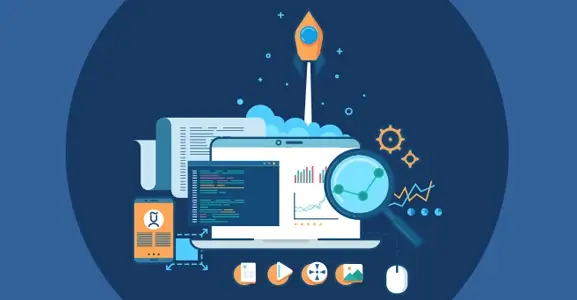
Dec 11, 2024
Top Contact Center Optimization Tools For 2024
“A thriving business knows how to fetch maximum output from limited resources by optimizing ca... Read More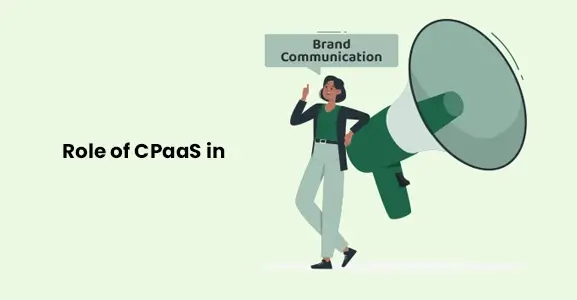
Nov 13, 2024
What Is Brand Communication? CPaaS Role Explained
Did you ever wonder why some advertisements grab your attention instantly, while others do not? The... Read More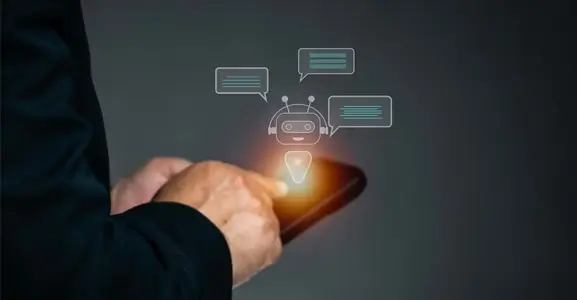
Nov 01, 2024
What Is Automated Messaging And How Does It Work?
Automated messaging or text automation empowers businesses and marketing professionals to connect wi... Read MoreLatest Updates
From Fonada
Industry Insights, Trends, Innovations, Updates, and Case Studies from Industry Experts
View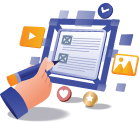
Customer
Reviews
Discover why our customers love us - read their authentic and heartfelt reviews!
View
Case
Studies
Explore real-life scenarios, offering analysis, and solutions to practical challenges
View
Convert Leads Into Sales With Fonada
Trusted CPaaS Solution Provider

